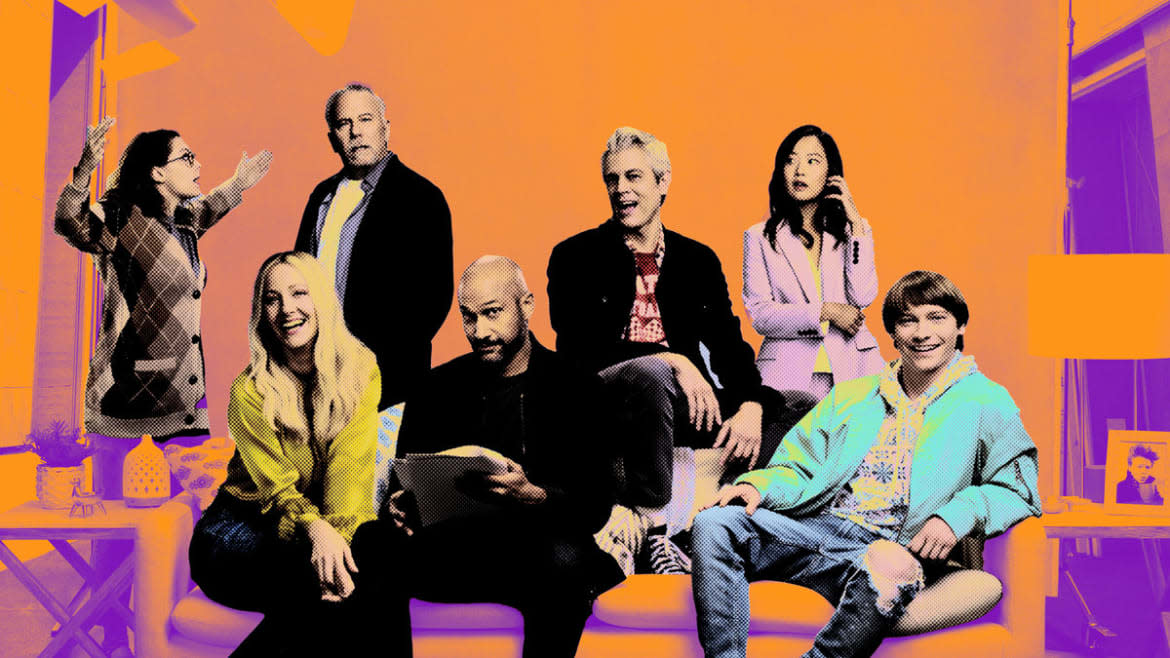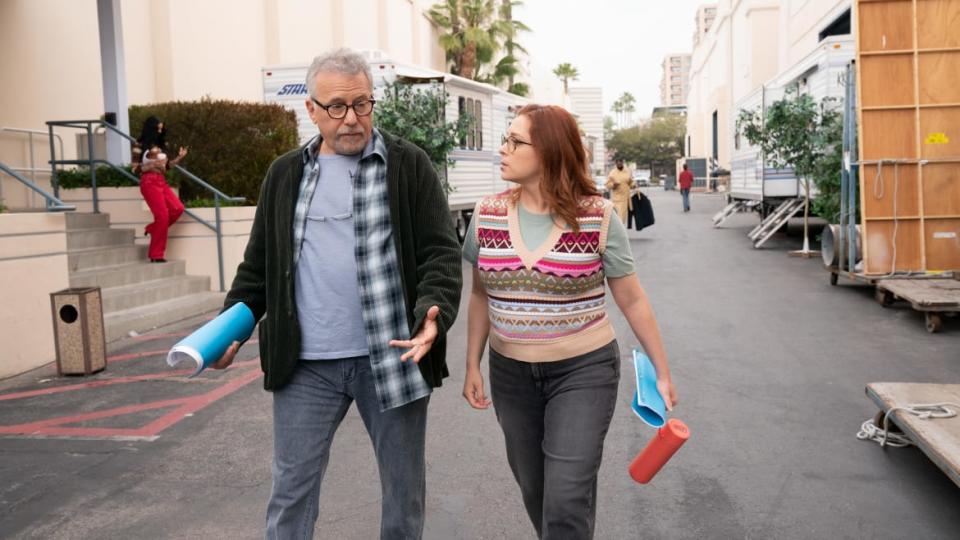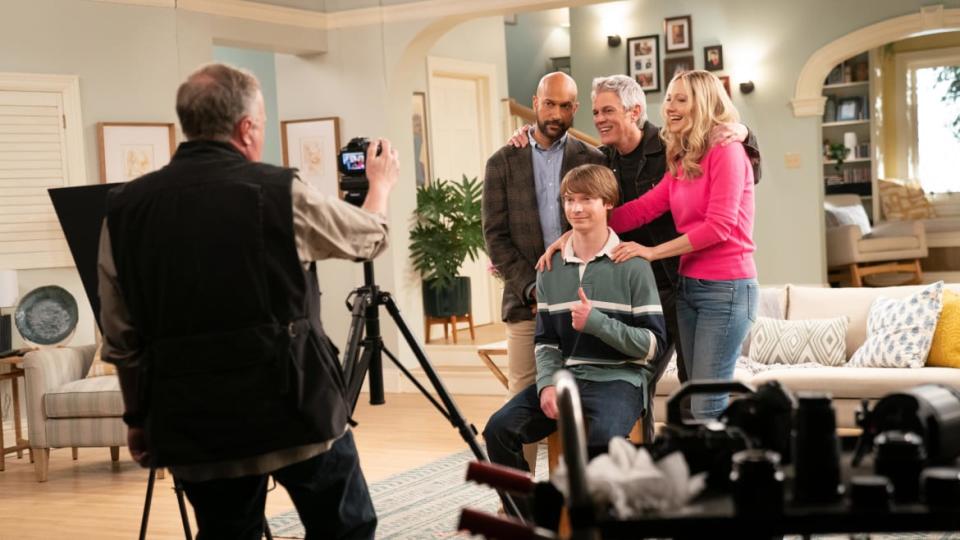‘Reboot’ Is Hulu’s Hilariously Meta Take on a TV Trend That Won’t Die

Resurrected television shows and films go to great lengths to avoid being labeled with the odious term “reboot.” You’ll often hear the people behind this kind of content refer to them as “reimaginings” to soften the stigma—like if Hester Prynn insisted that the scarlet letter on her chest stood for “autonomous.” It’s a more appealing word, but at the end of the day, everyone still understands that we’re talking about a piece of media that has been exhumed from the grave, dusted off, and pitched up with some fresh spackle.
Reboot, just by its title alone, understands that stigma perfectly. That’s also how it knows that it's rife for parody. Helmed by Modern Family co-creator Steven Levitan, the new Hulu comedy, out Tuesday, follows the on-set happenings of the cast of a fictional 2000s sitcom called Step Right Up once they’re tapped for a “reimagined” reboot of their show. Though Reboot exists to deftly skewer the contemporary television landscape, it does so with pleasant reverence. That Modern Family-ish combination of heart and hilarity can sometimes make Reboot feel uneven, though it’s always enjoyable.

From its opening scene, Reboot enjoys flexing the strength of its own meta privilege. Thirty-something, progressive writer Hannah (Crazy Ex-Girlfriend’s Rachel Bloom) takes a pitch meeting at Hulu, where execs sit around a table ready to hear her ideas. When she tells them that she wants to reboot Step Right Up with its original cast and an edgy new take, they’re interested. “You’re talking to the guy who greenlit the fifth season of Handmaid’s Tale!” one executive says, with verbal back-patting from his underlings.
That the actual executives at Hulu, where Reboot is airing, let jokes like this stay in the final cut not only surprised me but excited me. If the streamer was willing to acknowledge that, at a certain point, most long-running shows just become cash cows devoid of any meaning, I was intrigued about what could potentially come next.
That kind of allowance from the higher-ups gave us one of the century's greatest satires, 30 Rock, after all. One can’t see Netflix—a streaming platform so far up its own ass, it constantly shoves its own properties into the background of the content it produces—having this much humor about itself.
Once the new Step Right Up gets the green light, it’s off and running. The only problem is regrouping the cast, who have all parted ways for tumultuous careers post-cancellation. There’s Reed (Keegan-Michael Key), whose Yale School of Drama-educated ego has kept him from landing any significant roles; Bree (Judy Greer), who had a minor role on a sci-fi show that she left to become a Duchess in a fictional Nordic country; Clay (Johnny Knoxville), who settled into a shitty, boozy standup career; and Zack (Calum Worthy), a child star who grew up mostly normal and starred in a bunch of teen movies with titles straight from an Arrested Development episode.
Each member of the cast is hoping that this reboot will be their ticket back into the limelight, but it won’t be easy. There are messy relationships and old flames reignited, all while Hannah has to face off with Step Right Up’s original showrunner, Gordon (Paul Reiser), when he’s brought in to help steer the show (he technically still owns it). Gordon’s grouchy Gen-X surliness provides the perfect foil for Hannah’s millennial writing, and it’s within that contention where Reboot finds its funniest comedic beats.

It’s impressive how well Reboot straddles between its warring perspectives of Gordon’s outdated sitcom humor and Hannah’s overly woke, winking reimagining of Step Right Up. With the competing showrunners working together, the writers room is stocked with recent college grads on Hannah’s side and crabby, washed-up sitcom writers on Gordon’s. Some of the show’s biggest laughs come from the scenes of the generations pushing back at each other, particularly from the pairing of genius character actors Rose Abdoo and Fred Melamed.
What’s even better is that Reboot never makes its boomer writers offensive, only regressive. It’s the show’s middle finger to comedians who continuously claim that “wokeness” is neutering comedy. Here is irrefutable proof that there are plenty of punchlines left to mine from a more socially conscious world. Reboot understands the delineation between intentionally offensive “comedy” for shock value and genuine humor.
I Can’t Believe We Actually Laughed This Summer
Where the show occasionally stumbles is when it tries to balance that humor with emotional resonance. The core characters all have the built-in history of their relationships, but it takes a few episodes to really start caring about their lives and struggles off-set; we have to see their chemistry, just not just be told about it. By the time we do, half of Reboot’s eight-episode first season is already over.
If it weren’t for a clever twist that lands at the end of the first episode, the show might have ended up feeling much more lopsided than it ultimately does. But each time it remembers that its conceit is built around relationships that are as volatile as they are tender, Reboot pulls itself back on track.
And while the show takes plenty of time to lampoon both its own existence on a streaming platform and the critical opinion of reboots, I felt myself wishing it would twist the knife a little harder. The jokes at Hulu’s expense mostly drop off after the first few episodes, despite boasting the potential for the next Liz Lemon and Jack Donaghy pairing in Hannah and Gordon. Bloom and Reiser have stellar and believable chemistry, trading punchlines at breakneck speed, and it would be fun to see just how hard the two of them could roast Hulu.

The show really hits its stride while examining the culture of the reboot—so well, in fact, that I often didn’t realize how skillfully it was being done until the end of the season. Most reboots spend a great deal of their runtime on heavy-handed nods at their own existence, almost congratulating themselves for daring to endure amidst the criticism that there are no more original ideas in Hollywood. From the start, Reboot sends up the way that these movies and shows often try to fool audiences by claiming to be more edgy, modern, and relevant than their predecessors while being nothing of the sort. And at the same time, it studies how hard these productions clamor for that provocative energy behind the scenes, highlighting the cultural differences between the old guard and the new generation, often to gut-busting results.
Reboot can’t always avoid the shaky transition of thrusting its creator’s Modern Family-inspired style onto a streaming platform that allows for more cursing and sexual content. But even with those growing pains, it provides a genuinely clever lampooning of the current state of intellectual property. And with engaging performances from an eclectic cast of comedic actors, all bringing something unique to the table, Reboot has the potential to run wild with its premise in an ever-changing entertainment landscape. I just hope that won’t have to wait until 20 years from now, when Reboot inevitably gets a reboot of its own.
Get the Daily Beast's biggest scoops and scandals delivered right to your inbox. Sign up now.
Stay informed and gain unlimited access to the Daily Beast's unmatched reporting. Subscribe now.

 Yahoo News
Yahoo News 
